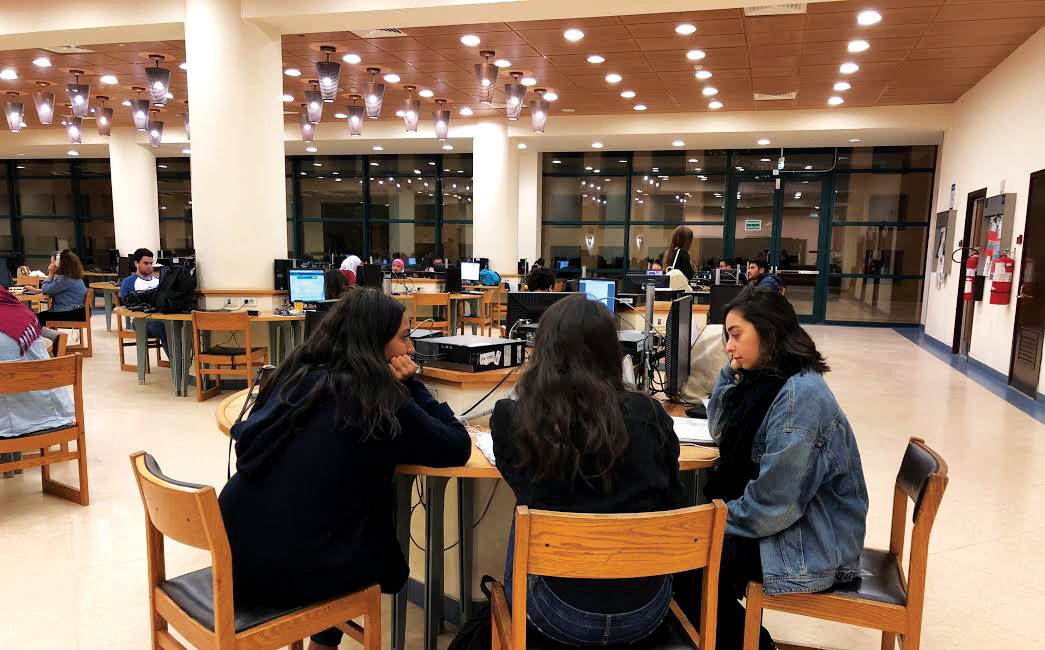In almost every course offered at the university, students often work in group settings on assignments and final projects.
Many students face difficulties working with classmates on grade-defining assignments. Consequently, they become either too controlling and do all the work on their own or do not engage with their group members altogether.
“Working in a group is the ultimate punishment. I go around begging my group members to get their work done and they rarely get it done on time so I end up doing my work and the work of four others,” said Mechanical Engineering senior Mohamed Hady.
Hoping to help students adapt to the group mindset, Mehry Gawaly, a part-time counselor at the Office of Student Well-being, held a workshop introducing effectice group work techniques on October 31 in the New Campus’ Jameel building.
“It’s a skill that you can develop. If you work more in teams, you will build this skill. Teamwork can be a positive experience,” said Gawaly.
Through the process of working together, students can learn from their colleagues, Gawaly explained. Some courses combine freshmen with juniors and sometimes even seniors, so the younger students could learn from the older group members.
This helps students share their experiences and exchange their knowledge.
She emphasized that what they learn does not necessarily have to be course related, it could just be skills such as, public speaking and presentations. They could even pick up tricks to enhance their researching skills.
Gawaly elaborated, using a number of steps, on how students can make the best out of their group assignments and turn them into an educational process instead of a stressful one.
The first step is through planning group meetings, which each group member needs to attend. For that to happen, each of the meetings scheduled needs to be carefully and precisely planned.
Before even deciding on a time and place for conducting the meeting, group members need to agree on its purpose and the outcome they wish to achieve. In addition, they need to take other’s previous arrangements into consideration and try to compromise, finding a time and place that suits everyone.
The group members then should divide the roles equally among them. It is preferred to give each member a role of their personal preference, to avoid further conflict and complications.
Gawaly said that mutual respect between group members will keep any conflict civil and ensures the best outcome from working with others.
“Avoid assigning blame and listen. Give them [teammates] credit,” she added.
By listening and being open to new ideas, one might compromise for the sake of a better outcome for the group as a whole. Perhaps even, through thoroughly listening to what other members of the group have to say, one might be convinced of a new idea.
One of the main reasons behind conflict between team members is that students are reluctant to give up control, fearing that their teammates might impact their grade negatively.
“All team members for a group are required to submit a peer evaluation form, where they rate the contribution of each team member to various aspects of the project,” explained Associate Professor of Marketing at the School of Business Hamed Shamma on how he avoids unfair grading during group assignments.
Working in groups helps students learn about compromising for the sake of others and dealing with challenging situations, Shamma said, explaining his logic behind assigning group tasks.
Gawaly explained that life is full of group tasks, from a simple solving of a puzzle to preparing and researching for a presentation.
“You cannot go through life all on your own. Imperfect people make perfect teams,” she stated.
Since students possess different skill sets, it is ideal for them to mobilize their strengths to come up with the best tasks for each of them.
“Core courses’ group projects are some of the hardest challenges I have faced since becoming a university student. Each of the group members is convinced he is smarter than the rest because of his “hard” major and belittles those around him,” complained Visual Arts junior Malak Sadeq.
Sadeq explained that it would be of no use to bring the professor into her issues with the team members, as the professor expects her students to be adults and resolve their issues on their own.
The counselor explained that working with others makes students think about the greater good. Instead of focusing on themselves and how they can improve, they are forced to think about the group as a whole.
